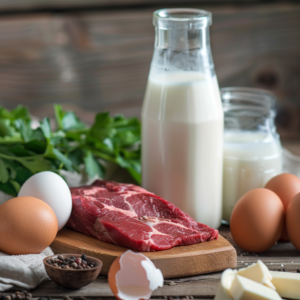
When bird flu diet, or avian influenza, hits the news, it often raises concerns about food safety. Many ask, “Should I stop eating milk, beef, and eggs?” Let’s break it down together and find out what’s safe to eat during these outbreaks.
Understanding Bird Flu
First, let’s discuss bird flu. It’s a virus that mostly affects birds, especially poultry. However, it can sometimes jump to humans, most of the time by coming into close touch with infected birds or their droppings. The symptoms can vary, including coughing, fever, or even more severe issues in rare cases.
It’s super important to understand how the virus spreads during a bird flu outbreak. Birds that have the virus can spread it through their breath and droppings, which might contaminate their surroundings. The good news? You can minimize your risk by correctly washing your hands and cooking your food.
The Role of Diet in Health During Bird Flu
Now, let’s get to the juicy part—your diet! A healthy food is important for keeping your immune system, especially during a health scare. Your immune system is your body’s defense against infections, so it’s crucial to fuel it right.
What should you be eating? Focus on colorful fruits and veggies! These foods will help your body fight help boost your immune health. Whole grains like brown rice and quinoa provide energy and essential nutrients. Don’t forget healthy fats from avocados and nuts, which reduce inflammation.
Common Misconceptions
You may have heard that certain foods, like milk, beef, and eggs, are risky during bird flu outbreaks. Let’s clear that up!
Milk: Some people think that milk from infected animals is dangerous. The truth? Bird flu doesn’t spread through dairy products. Pasteurization, the process that heats milk to kill harmful bacteria, keeps it safe to drink. So, if you enjoy your morning glass of milk, there’s no need to skip it!
Beef: Worries about beef often come from general fears about meat during health outbreaks. While ensuring your meat comes from healthy animals is wise, beef doesn’t carry bird flu. Proper cooking will take care of potential pathogens, so you can still enjoy a nice steak or burger.
Eggs often get a bad rap, but they’re not the enemy! Bird flu primarily affects birds, not the eggs they lay. If you cook your eggs thoroughly, you can enjoy them without concern. They’re an excellent source of protein, so don’t miss out!
Nutritional Alternatives
If you still feel unsure about certain foods, don’t worry! There are plenty of nutritious alternatives to consider.
Plant-Based Protein: If you want to explore other options, consider legumes, lentils, and beans. They pack a protein punch without the risks associated with animal products during an outbreak.
Dairy Alternatives: If you’re leaning away from dairy, you have fantastic choices! Almond, soy, and oat milk are delicious alternatives that offer similar benefits.
Safe Poultry Options: Chicken can be safe to eat when properly cooked, but it’s wise to get your poultry from trusted sources. Make sure the birds are healthy and raised in clean environments.
General Dietary Recommendations During Bird Flu
Let’s discuss general tips for eating well during a bird flu outbreak. These will help you stay healthy without worrying too much about specific foods.
Whole Foods Are Your Friends: Focus on whole foods—fruits, veggies, whole grains, and lean proteins. These foods will give your body the food it needs to fight infections.
Stay Hydrated: Remember hydration! Water is essential for your health. Herbal teas and broths can also keep you hydrated and warm.
What to Avoid: During these times, it is wise to limit processed foods and sugary snacks. These can weaken your immune system and aren’t as beneficial for your overall health.
Conclusion
As news about bird flu spreads, it’s important to remember that you don’t need to worry about what you eat. A healthy, well-balanced meal can be good for your body fight off sickness. stay strong without cutting out things that your body needs. Milk, beef, and eggs can stay in your meals safely as long as they are sourced and cooked properly.
So, eat a range of foods and learn about what’s good for your health. You don’t need to cut out important foods out of fear; the goal is to stay healthy and strong during these tough times.
Call to Action
What do you think during bird flu diet? During health scares, have you changed the way you eat? Tell us what you think and what you’ve done in the comments! Thank you for reading. If you found this helpful, please subscribe for more health tips.
If you want to learn my #1 Jacked Factory Burn-XT Clinically Studied Fat Burner & Weight Loss Supplement, Click Here Now.





